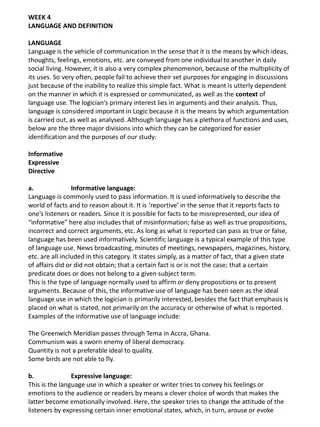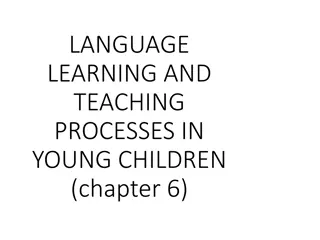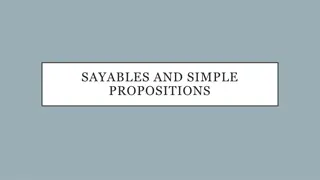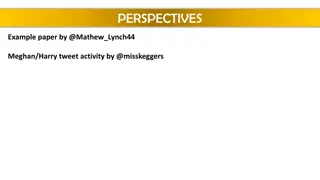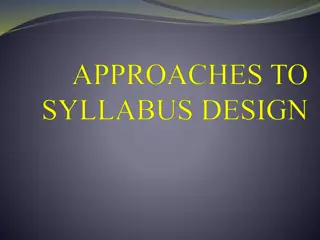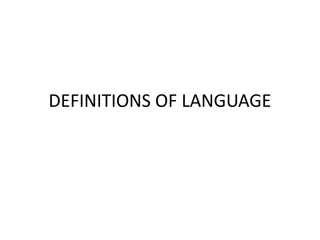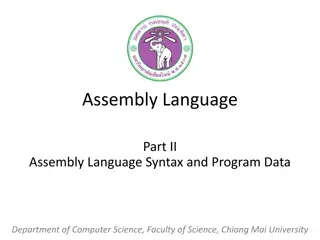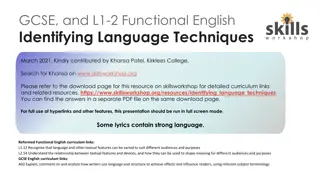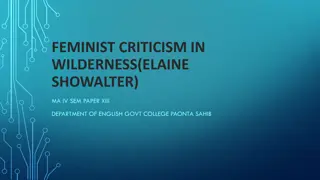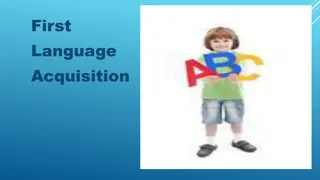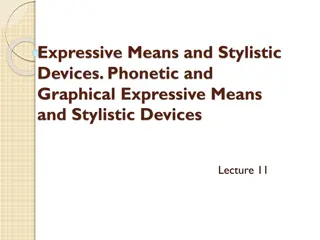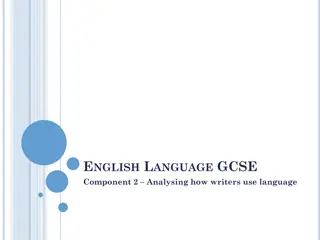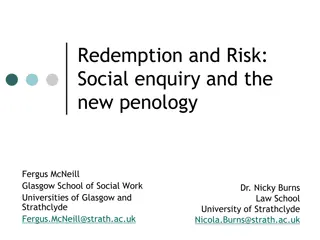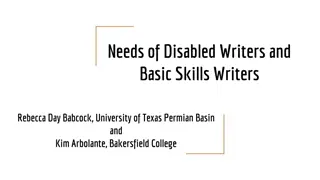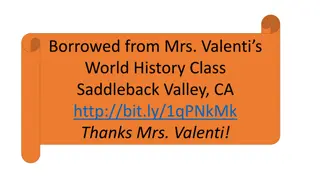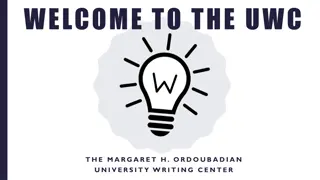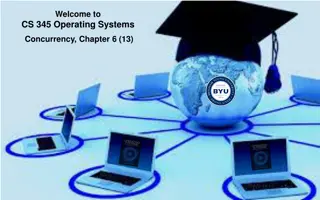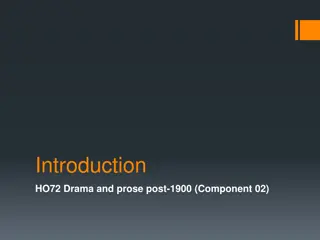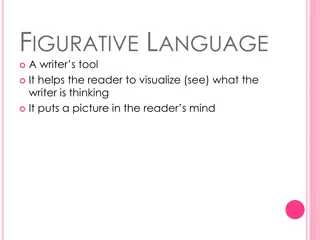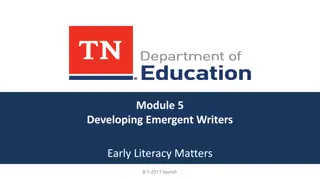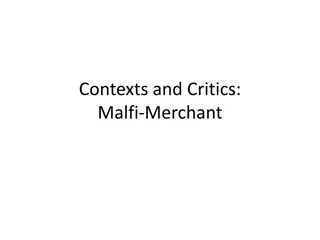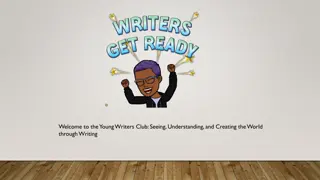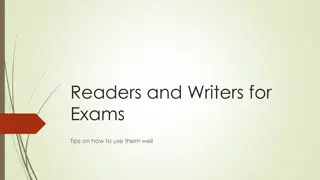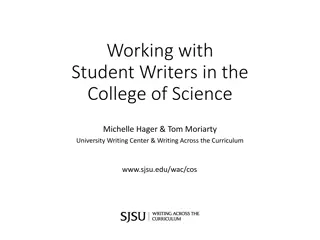Career Opportunities and Challenges in Translation & Interpreting Pedagogy Post-Pandemic
The APTIS 2022 conference explores new avenues in Translation and Interpreting (T&I) pedagogy amidst a changing landscape. Dr. Bego A. Rodriguez highlights emerging roles for T&I graduates. The context reveals a decline in language learning in the UK, impacting the Language Service Industry. The UK'
0 views • 13 slides
Language Study Community – Enhance Your Language Skills
Joining a Language Study Group is a fantastic way to take your language learning to the next level. By leveraging the power of Group Study, you can immerse yourself in the language, enhance your understanding, and build confidence in your speaking abilities. Read full article \/\/explainlearning.com
1 views • 3 slides
Academic Language Demands and Supports in Instructional Planning
Academic Language Demands and Supports are crucial in educational settings to ensure comprehension and usage of language by students. This content discusses embedding language demands in lesson plans, providing language supports, and peer review activities to enhance academic language skills. The fo
6 views • 10 slides
The Significance of Media in Language Learning
Media plays a crucial role in language learning by raising awareness of the ideology behind linguistic structures and providing valuable information on society and culture. Linguists are drawn to media language for research purposes and to understand its impact on language use and attitudes. Media s
11 views • 5 slides
Understanding Translation: Key Concepts and Definitions
Translation involves transferring written text from one language to another, while interpreting deals with oral communication. Etymologically, the term "translation" comes from Latin meaning "to carry over." It is a process of replacing an original text with another in a different language. Translat
11 views • 76 slides
Language and Communication in Society: Understanding Interactions
Explore the intricate relationship between language and society through lectures focusing on language in interaction, power dynamics, language contact and change, public space discourse, linguistic landscaping, and more. Delve into the shift from structural linguistics to societal communication, red
6 views • 28 slides
Understanding Language: Informative, Expressive, and Directive Uses
Language serves as a vital medium for communication, allowing the conveyance of ideas, thoughts, and emotions. It is a complex phenomenon with diverse uses. This text delves into the three major divisions of language use - informative, expressive, and directive. Informative language conveys facts, w
3 views • 6 slides
Language Learning and Teaching Processes in Young Children
Development of language in young children is influenced by various factors such as their cultural and linguistic environment, unique characteristics, and interactions with adults. Optimal language development requires language stimulation from the environment. Varied cultural practices impact langua
1 views • 51 slides
Understanding Language in Stoicism: Significance and Corporeality
Language in Stoicism plays a crucial role in the process of assenting to impressions by focusing on corporeality, reason, and truth. It distinguishes between the mundane vocal sounds, articulated speech, and significant language to convey meanings effectively. The significance of language lies not i
0 views • 13 slides
Analyzing Perspectives: Writers' Thoughts and Emotions
Delve into the perspectives of writers showcased in an example paper by Mathew Lynch and Meghan/Harry tweet activity by misskeggers. Explore questions on the writers' thoughts, feelings, imaginings, and experiences, and understand how they convey their perspectives through various methods and tones.
0 views • 20 slides
Understanding Language Teaching Syllabus: Integration, Theory, and Approaches
Language Teaching Syllabus involves the integration of subject matter and linguistic elements, guided by theories of language and learning. Various approaches like Grammatical, Situational, Communicative, and Analytic are used to structure syllabi. Breaking language into parts aids in sequential lea
1 views • 28 slides
Exploring Language and Communication Through a Short Film
In this lesson, students will watch a 10-minute short film titled "The Most Beautiful Thing" by Cameron Covell. They will reflect on the value of learning another language, analyze how facial expressions and body language convey emotions, and develop empathy towards those facing language barriers or
0 views • 29 slides
Various Definitions of Language Throughout Linguistic History
Different linguists and scholars have offered various definitions of language over time. Sapir (1921) emphasized language as a method of communicating ideas, emotions, and desires through voluntary symbols. Bloch and Trager (1942) focused on the social aspect of language as a system of vocal symbols
1 views • 12 slides
Introduction to Assembly Language Syntax and Program Data
Learn about the syntax of assembly language and how data, variables, and constants are used in programming. Explore the basic instructions and the translation of high-level language into assembly language. Discover the role of an assembler in translating assembly language programs into machine langu
3 views • 36 slides
Enhancing Language Learning Across the Curriculum in B.Ed. 1st Year Course
Language Across the Curriculum (LAC) emphasizes that language learning should occur across all subjects, not just in language classrooms. It highlights the importance of incorporating language development into every learning activity, fostering multilingualism in schools. Language plays a crucial ro
2 views • 34 slides
Identifying Language Techniques in English Literature
Explore language techniques used by writers, understand their definitions, and create sample sentences for each technique. Enhance your skills in recognizing language features through a variety of engaging exercises and examples. Dive into the world of literary analysis with this resource.
0 views • 27 slides
Feminist Criticism in the Wilderness by Elaine Showalter - Analysis
Elaine Showalter's essay "Feminist Criticism in the Wilderness" delves into the realm of feminist literary critique, addressing the diversity among women writers and emphasizing the importance of considering factors beyond gender. Showalter highlights the challenges and goals of feminist criticism w
0 views • 13 slides
Understanding First Language Acquisition Process
First language acquisition is the process through which humans develop the capacity to perceive, comprehend, and effectively use language to communicate. It primarily focuses on infants acquiring their native language. Basic requirements, caregiver speech features, and the acquisition schedule play
0 views • 19 slides
Exploring Writers' Viewpoints Through Music Texts
Dive into a lesson on evaluating writers' viewpoints and perspectives using music texts like Katy Perry's "Chained to the Rhythm." Understand the techniques writers use to convey their ideas and messages, and apply evaluation skills to analyze lyrics effectively.
0 views • 12 slides
Understanding Figurative Language: A Guide to Metaphors, Similes, and More
Figurative language is a powerful tool used by writers to evoke emotions and create vivid imagery in the minds of readers. It goes beyond literal meanings, allowing for deeper interpretations and connections with the subject matter. This guide explains the difference between figurative and literal l
0 views • 40 slides
Speech and Language Developmental Milestones: A Bilingual/Multilingual Perspective
Speech and language developmental milestones are crucial for children, regardless of their home language. These milestones encompass receptive language, expressive language, pragmatics, and articulation and phonology. Understanding how a child hears and talks from birth to one year is essential, as
1 views • 23 slides
Understanding Expressive Means and Stylistic Devices in Language
Expressive means and stylistic devices play a vital role in intensifying language utterances, encompassing phonetic, morphological, lexical, word-building, phraseological, and syntactical forms. These tools help evoke emotions, logical emphasis, and additional meaning in communication. By utilizing
0 views • 13 slides
Analyzing Writer's Language Use in English Language GCSE Component 2
In English Language GCSE Component 2, students learn to analyze how writers use language. The learning objective focuses on commenting, explaining, and analyzing language use with relevant subject terminology. The exam assesses students on their ability to interpret and explain a writer's thoughts,
0 views • 12 slides
Redemption and Risk: Social Enquiry and the New Penology
Social enquiry explores transitions from old to new penology, emphasizing risk management over treatment and responsibilization over mitigation. Probation officers act as storytellers shaping perceptions in the criminal justice system, prompting humane responses and social explanations. Research del
2 views • 20 slides
Introduction to Language Technologies at Jožef Stefan International Postgraduate School
This module on Knowledge Technologies at Jožef Stefan International Postgraduate School explores various aspects of Language Technologies, including Computational Linguistics, Natural Language Processing, and Human Language Technologies. The course covers computer processing of natural language, ap
0 views • 27 slides
Understanding the Needs of Disabled and Basic Skills Writers in Writing Centers
Explore the challenges and strategies related to disability, basic skills development, and access barriers faced by writers in educational institutions. Learn about evidence-based practices and developmental models to support diverse writers in improving their writing skills.
0 views • 13 slides
Exploring Sociolinguistics: Language Variation and Social Factors
Sociolinguistics delves into the study of language variation influenced by social factors, examining the relationship between language and its social context. It explores various aspects like standard pronunciation, language choice, speech acts, language components, language variety, and factors suc
0 views • 73 slides
Understanding Assembly Language Programming for Computing Layers
Assembly language is a low-level programming language that enables direct interaction with a computer's hardware components. This content explores the fundamentals of assembly language, the relationship between human-readable machine language and binary code, an assembly language program for multipl
0 views • 31 slides
Italian Renaissance: Writers and Artists Spotlight
Italian writers like Dante Alighieri and Niccolo Machiavelli made significant literary contributions during the Renaissance period. Dante's iconic work, "The Divine Comedy," showcased societal issues, while Machiavelli's "The Prince" offered political advice emphasizing practicality over theory. Ita
0 views • 22 slides
UWC Margaret H. Ordoubadian University Writing Center Information
The UWC Margaret H. Ordoubadian University Writing Center provides a range of services to help writers at all stages of the writing process. Located in Walker Library, the center offers assistance with brainstorming, drafting, revising, and understanding assignments. Writers can bring various projec
0 views • 13 slides
Understanding Language Anxiety in Foreign Language Learning and Teaching
Explore the impact of language anxiety on students and teachers in foreign language learning and teaching contexts through insights from Dr. Christina Gkonou's research. Delve into the theoretical background, implications for language education, and real-life experiences shared at the Essex Language
0 views • 25 slides
Mastering Concurrency in Operating Systems: Tips and Strategies
Explore intricate concepts in operating systems concurrency from Chapter 6 of CS 345. Learn practical tips and techniques such as determining the size of arrays, managing readers and writers using semaphores, and tackling the Barbershop Problem. Dive into array manipulation, semaphore usage, and pri
0 views • 37 slides
Study of Modern Drama and Prose Post-1900
This component focuses on the study of a modern play (The History Boys) and a modern prose text (The Great Gatsby). Learners explore cultural and contextual influences on writers and readers, analyze literary texts, demonstrate understanding of contexts, and make connections across texts. The examin
0 views • 23 slides
Understanding Figurative Language in Writing
Figurative language is a powerful tool that writers use to enhance their work by creating vivid images in the reader's mind. This includes techniques such as similes, puns, oxymorons, allusions, foreshadowing, and paradoxes, each serving a unique purpose in conveying deeper meanings and engaging the
0 views • 27 slides
Comprehensive Overview of Writers Workshop Practices and Protocols
Explore the essential elements of Writers Workshop in educational settings, including course introductions, collaborative revision approaches, tuning protocols, and student feedback mechanisms. Learn about effective strategies, outcomes, and lessons learned to enhance the workshop experience for wri
0 views • 7 slides
Developing Emergent Writers: Module 5 Overview
Module 5 focuses on developing emergent writing skills in children through activities that enhance fine motor skills, hand-eye coordination, and left-to-right directionality. Teachers play a crucial role in modeling purposeful writing and providing opportunities for children to experiment with writi
0 views • 11 slides
Influential Writers: Chaucer and Webster in English Literature
Chaucer, born in mid-14th century London, was influenced by French and Italian poets, creating impactful works like "The Canterbury Tales." On the other hand, Webster, born in 1580, crafted dark revenge tragedies like "The Duchess of Malfi," reflecting the troubled mood of his time. Both writers lef
0 views • 7 slides
Exploring the World of Young Writers Club: Writing, Creativity, and Perspective
Delve into the realm of writing with the Young Writers Club, where members immerse themselves in the art of expression, exploring diverse perspectives through words. From quick writes to creating poems using six words, participants engage in thought-provoking activities and gain insights into the po
0 views • 17 slides
Effective Strategies for Using Readers and Writers in Exams
Learn how readers and writers can assist you during exams by decoding text, reading instructions, and more. Discover what they can and cannot do, as well as useful phrases to communicate effectively with them. Explore the benefits of having a scribe for expressing thoughts quickly and effortlessly i
0 views • 10 slides
Enhancing Student Writers' Skills in Science Disciplines
Student writers in the College of Science may struggle with transferring writing skills to new contexts. This article explores why writers forget and provides strategies for teachers to assist students in mastering unique writing genres within science disciplines.
0 views • 25 slides






